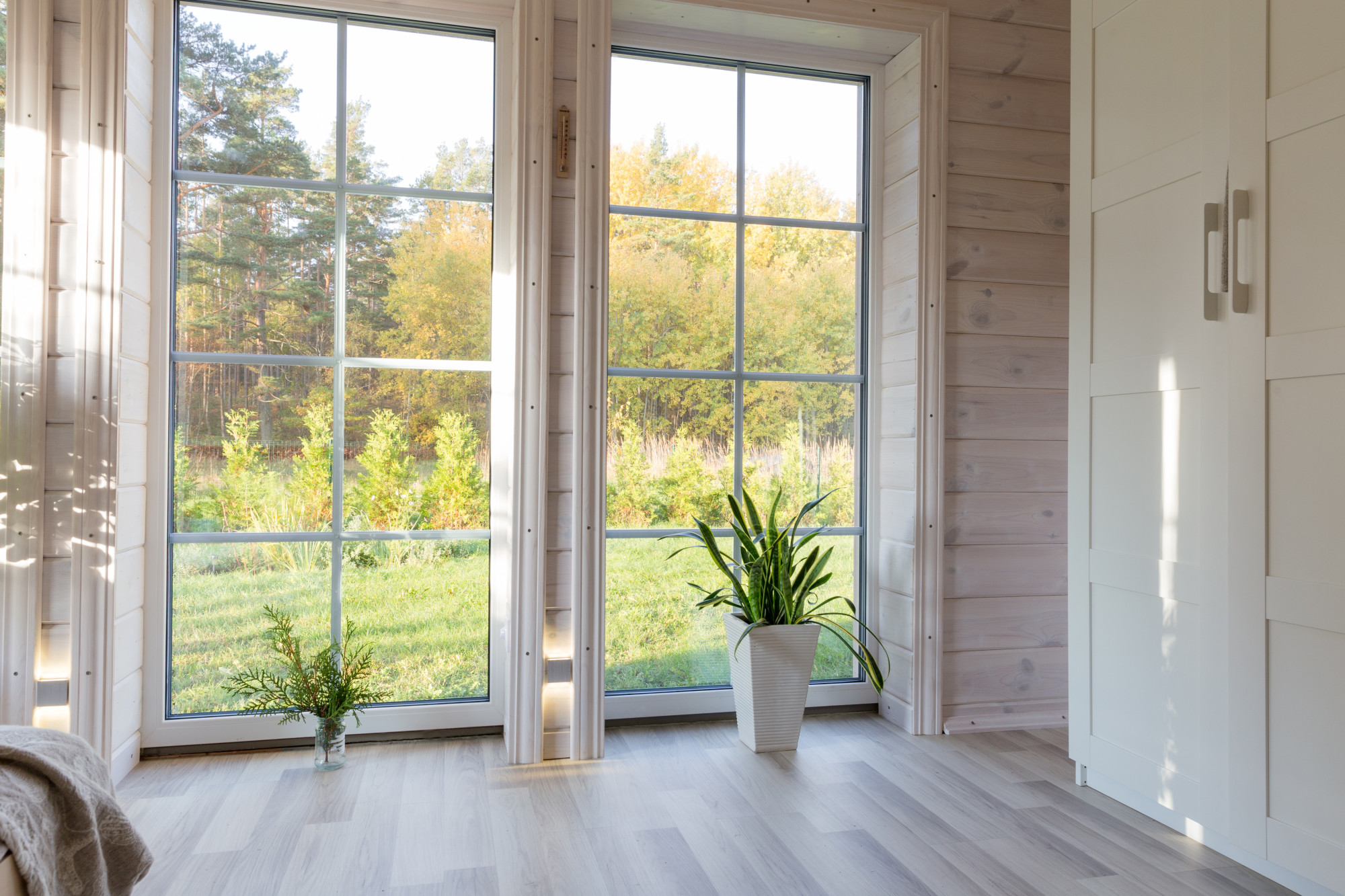What You Should Know Before Adding Floor-to-Ceiling Windows to Your Home
Exposing yourself to natural light boosts your Vitamin D, wards off seasonal depression, improve your sleep, and provides so many other health benefits. With so many health benefits, it’s understandable why so many people are adding floor-to-ceiling windows to their homes. They bring in natural light, add resale value, and are a great way to show off your views.
Before you make the switch, there are a few things you should keep in mind. In this article, we’ll discuss the pros and cons of installing floor-to-ceiling windows in your home. You can then make an informed decision about whether or not they’re right for you.
What Are Floor-To-Ceiling Windows?
Floor-to-ceiling windows are exactly what they sound like: large glass panels that go from the floor all the way up to the ceiling. The size of these windows varies, but they typically measure at least 8 feet in height.
They replace a wall, making it easier to enjoy natural light and stunning views. but losing a wall means less space for things like artwork and furniture. If your space is small, it can mean sacrificing space for style.
Glass Walls VS Floor-To-Ceiling Windows
Glass walls and floor-to-ceiling windows are both excellent options for bringing in natural light and an open feeling. Glass walls offer full-length visibility. Floor-to-ceiling windows are divided into sections.
With glass walls, you can more easily enjoy views of your entire landscape because there isn’t a break in the window pane at the top or bottom. On the other hand, floor-to-ceiling windows divide your view into several separate panes.
Advantages of Floor-To-Ceiling Windows
There are many benefits to adding floor-to-ceiling windows to your home. The most obvious is the addition of natural light and stunning views. Floor-to-ceiling windows can also create the illusion of a larger space, as they draw the eye up and add a feeling of openness. Furthermore, they are a great way to add architectural interest and can create an airy, modern look.
Natural Light
One of the main benefits of installing floor-to-ceiling windows is the addition of natural light. These large windows allow a maximum amount of light to enter your home during the day, which can make your space brighter and airier.
Ventilation
Floor-to-ceiling windows allow you to open the entire window and enjoy a nice breeze without the need for an air conditioner. This can help you reduce your energy bills during the summer months.
Increased Insulation
The additional glass surface area that comes with floor-to-ceiling windows can improve your home’s insulation. This reduces energy costs. This can be especially beneficial in cold climates where windows are often a source of heat loss.
Dramatic Aesthetic
Floor-to-ceiling windows can give any space a dramatic and luxurious look. This is harder to achieve with traditional window treatments. If you’re looking to add some pizzazz to your home, floor-to-ceiling windows may be the perfect option for you.
Curb Appeal
Floor-to-ceiling windows can also add to the curb appeal of your home by creating an eye-catching exterior feature. These large windows can make your home stand out from the others on the block and can increase its value in the eyes of potential buyers. So if you’re thinking of selling your home in the future, adding floor-to-ceiling windows may be a wise investment.
Adds Elegance
Adding floor-to-ceiling windows to your home can give it an elegant and sophisticated look that is hard to achieve with traditional window treatments. It’s a great way to make your home look more luxurious without breaking the bank.
Disadvantages of Floor-To-Ceiling Windows
While floor-to-ceiling windows can add a lot of beauty and value to your home, there are also some potential drawbacks. Some may argue that the biggest drawback is the cost.
Cost
Floor-to-ceiling windows are more expensive than traditional windows. This is because they require larger pieces of glass and specialized installation. So if you’re on a tight budget, floor-to-ceiling windows may not be the best option for you.
Maintenance Cleaning and Weatherproofing
Your large floor-to-ceiling windows will require more frequent cleaning and weatherproofing than traditional windows. Make sure to clean your windows regularly to prevent dirt and dust from building up and causing damage. You may also want to consider weatherproofing your windows to protect them from the elements.
Privacy
Floor-to-ceiling windows reduce your level of privacy as people can easily see inside from the outside. You’ll need to incorporate window coverings or other treatments to ensure a sense of security and seclusion.
Furniture Damage
In order to protect your furniture from the sun, consider using window treatments such as blinds or curtains. This will help to prevent sunlight from damaging your furniture and causing it to fade over time.
These drawbacks are often outweighed by the many benefits that floor-to-ceiling windows can add to your home. If you’re looking for a way to make your home stand out and increase its value, floor-to-ceiling windows may be the perfect solution.
However, make sure to do your research and consider all of the pros and cons before making a final decision. With the right planning, floor-to-ceiling windows can make your home more beautiful, comfortable, and energy-efficient for years to come.
Floor-To-Ceiling Window Styles
When you choose to install floor-to-ceiling windows, there are many different styles and options available. From the traditional single pane to multi-paned bay or bow windows, you can find a style that fits your home’s aesthetic.
Some of the most popular types of floor-to-ceiling windows are single-pane windows, bay windows, and sliding windows.
Single-pane windows provide a simple, timeless look and are the most energy-efficient option. Bay windows create the illusion of greater space while offering protection from the elements. With the multiple panes in bay and bow windows, you can open them to let in the fresh air and natural light.
Sliding windows are easy to open and close and create a sleek, modern look. Awning windows open outward at the top or bottom to allow fresh air in without sacrificing privacy. Casement windows open with a crank handle and can bring fresh air into smaller spaces.
Considerations
Adding floor-to-ceiling windows is an excellent way to improve both the energy efficiency and value of your property. However, there are several important things you should consider before taking on such a project.
Experienced Professionals
Its crucial to make sure that the window installation work is done by experienced professionals. Floor-to-ceiling windows require precise measurements in order for them to fit properly and provide the most benefit in terms of insulation value and air quality. You want to make sure they are installed correctly so that they can last for years to come.
Building Codes
You need to take into account the local building codes in your area. Floor-to-ceiling windows must meet certain standards and have the necessary permits and approvals from your local government before they can be installed. It is important to check with the local authorities about any requirements that may be needed for such a project.
Materials
Research and select the best type of material for your floor-to-ceiling windows. Different materials have different characteristics when it comes to insulation, air quality, energy efficiency, noise reduction, and other factors. You should consider all these aspects when deciding which one is right for you.
Budget
Don’t forget to budget for extra costs. Floor-to-ceiling windows can be more expensive than regular windows due to the higher quality of materials and installation requirements. You may also need to hire an electrician or other specialist to install the necessary wiring or other elements that make up this type of window system.
What Are the Best Treatments For Floor To Ceiling Windows?
There are several treatments available for floor-to-ceiling windows, depending on the look and feel you want to achieve. Popular options include roller shades, blinds, shutters, curtains, or even draperies. Each of these offers different levels of insulation, privacy, and light control so be sure to consider your needs when making a decision.
Roller Shades
These shades are becoming increasingly popular due to their modern look and ease of use. You can install them at any height, allowing you to adjust the amount of light that comes through as desired.
Blinds and Shutters
Blinds provide a classic window treatment with adjustable slats that allow you to control the level of privacy and light. Shutters provide added insulation benefits while maintaining an elegant appeal in any space.
Curtains and Drapes
Drapes can bring softness and warmth to your interior, creating a cozy atmosphere. Additionally, they offer excellent sound absorption properties that make them perfect for noise reduction.
Materials Used To Make Floor To Ceiling Windows
The framing material you choose for your floor-to-ceiling windows can determine the longevity and energy efficiency of the window system. Common choices include wood, vinyl & aluminum frames.
Wood is a traditional choice that provides an elegant look, but it tends to be more expensive. Vinyl frames are known for their durability and affordability. Aluminum frames offer strength and a contemporary. All while providing insulation values comparable to wood frames.
Need Replacement Windows?
By understanding both the advantages and disadvantages of floor-to-ceiling windows, you can make an informed decision about whether or not they’re right for you. Looking for new windows or replacement windows? Be sure to research reputable professionals in order to guarantee a quality installation.
Window King LA is the vinyl window replacement and installation specialist in the Huntington Beach and Long Beach areas. Our team of experts will work with you to find and install the perfect window system for your home. Contact us today for a free consultation!




